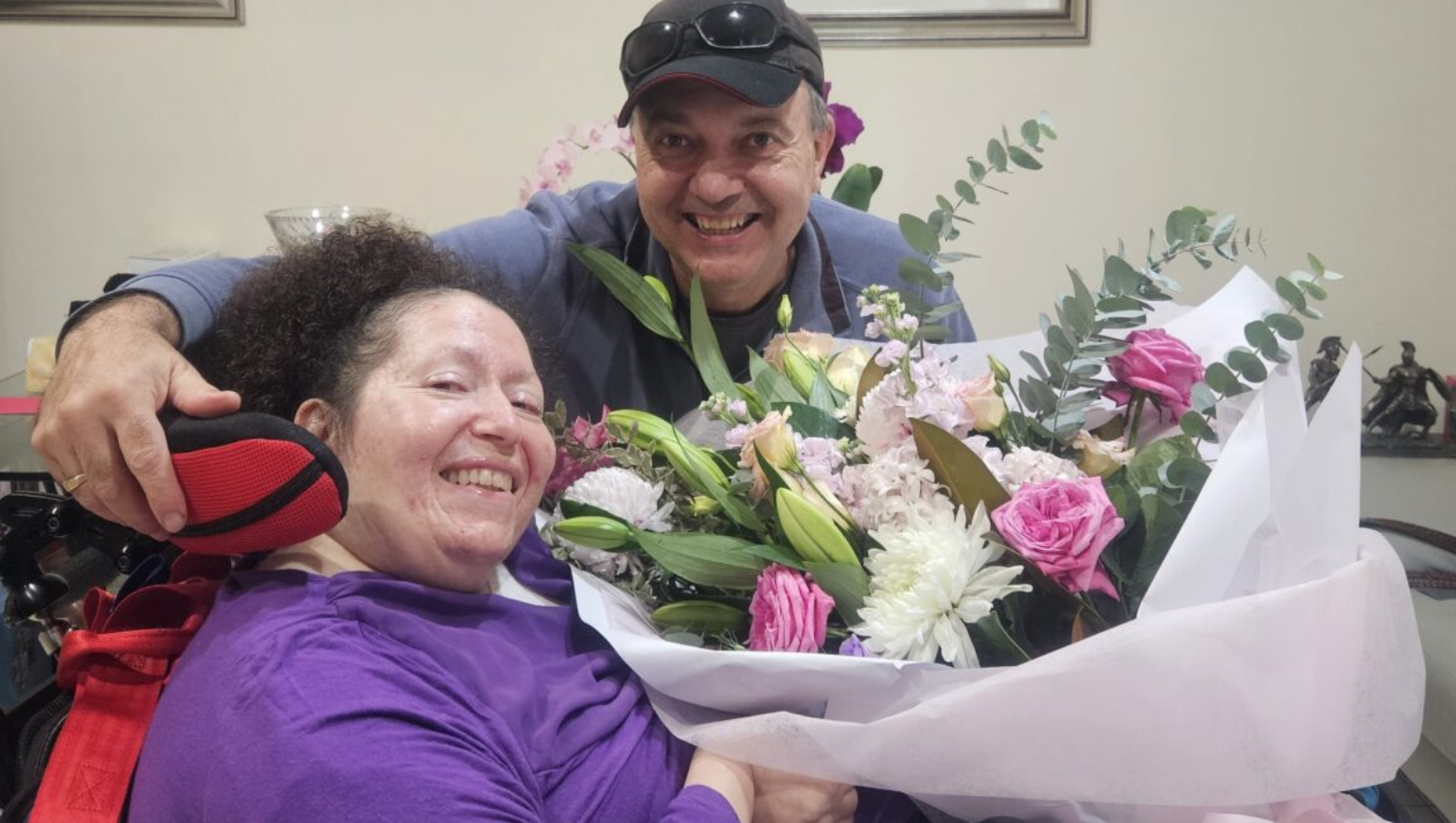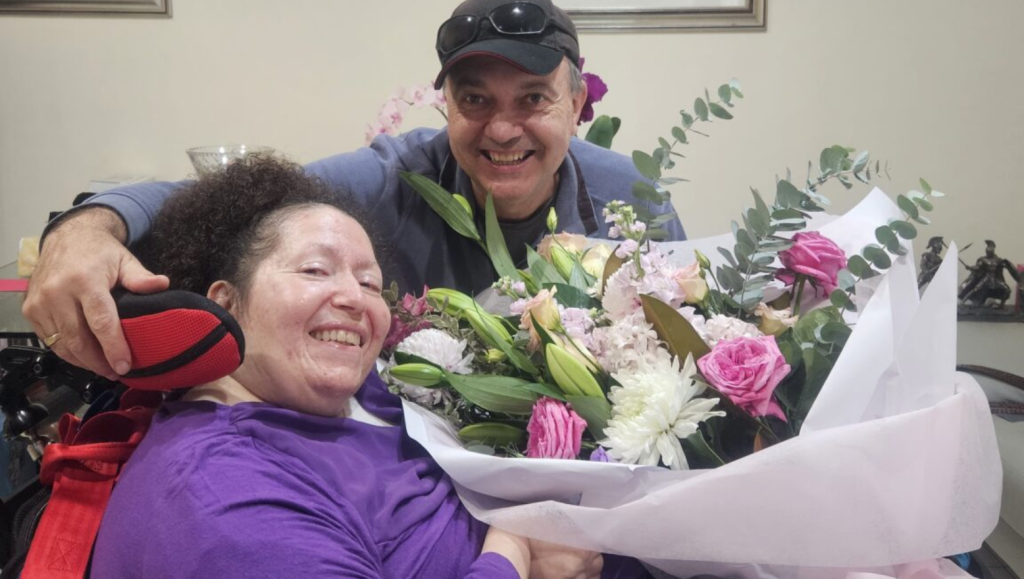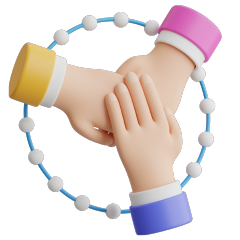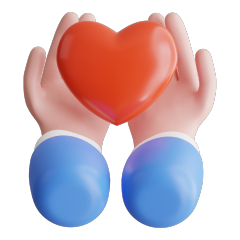‘A miracle girl’: Joy’s Story

Joy requires complex care, also known as high intensity support. These supports are intensely personal in nature and present some of the highest risks for NDIS participants. Complex care can only be delivered by a person with the appropriate skills, training and qualifications.
How complex care support helped a couple cope with MS
“Joy’s story is a big one,” Angelo tells us over the phone. He and Joy tied the knot in 1990. Two years later, Joy was diagnosed with multiple sclerosis, “an insidious disease”, as Angelo describes it.
After the birth of their second son, Joy was no longer able to walk.
“So then I had to come home with my wife not being able to walk and also a new baby.”
Angelo took a year off work to take care of his young family. He had to manually lift and transfer his wife, damaging his back. Thankfully, this stressful, chaotic period came to an end with the help of the NDIS and Leora.
Joy now receives complex care support from carers four hours a day, seven days a week.
“Because Joy is high needs, they can’t just send in anyone off the street,” Angelo says. “Leora has developed systems, developed processes and procedures, the relevant training required, and that helps a lot with getting the right people to look after a high needs person, like my wife.”
“When you get carers that really care, it makes a phenomenal difference. It’s just amazing, and that’s what we’ve got.”
Angelo says Joy has been “on the edge of life many, many times. I’ve had to perform CPR on Joy at least on four occasions. I’ve been told by doctors that there’s no chance, she’s not going to make it and she won’t survive, but she somehow finds her way. Joy is actually a miracle girl.”
Keep reading to learn more about Angelo and Joy, and the complex care support they receive from Leora.

Multiple Sclerosis
Joy was diagnosed with multiple sclerosis in October 1992. “She had symptoms over the years, various things, because it affects the nervous system.”
Multiple sclerosis or MS is a chronic disease affecting the brain and spinal cord (central nervous system). Nearly 3 million worldwide are living with MS. In Australia, it affects three times more women than men. (Read more: What is multiple sclerosis? )
In MS, the immune system attacks the protective sheath called myelin that covers nerve fibres. Damage to the myelin causes communication problems between the brain and the rest of the body. It can also eventually cause permanent damage of the nerve fibres as they become exposed and scarred. Common symptoms include vision problems, changes in memory, trouble with walking, weakness and fatigue.
Angelo and Joy have two sons. For the birth of their second son, Joy was advised to deliver via caesarean under general anaesthetic.
“They felt it was the best way for her to deliver the second boy rather than having a natural birth because they feel that she wouldn’t be strong enough due to the MS to deliver the baby.”
Unfortunately, the general anaesthetic had a negative effect, and Joy was no longer able to walk. As Angelo puts it, “She hobbled into the hospital, she didn’t walk out of the hospital.”
Assistance at home
Angelo took a year off work to take care of Joy and their children. “During that period it’s really, really stressful because I had no supports at all. I didn’t know anything about carers, and the NDIS didn’t exist in those days anyway.”
After about a year, Angelo welcomed MS Australia into their home “because I couldn’t lift Joy anymore. I was manually lifting her, no hoist, no nothing. It was me just lifting her to a manual wheelchair and moving her around.
“The MS people said you can get some assistance in the home. That’s exactly what we needed. My back was damaged, and I couldn’t really do much. So I told Joy that we really have to accept the assistance.”
After the roll out of the NDIS, Angelo heard about Leora from their MS Coordinator.
“When I enquired, two people from Leora actually came into my house. One was a coordinator and the other was a woman, I didn’t know who she was. I asked her, What is your role in the company?”
The woman was Esha Oberoi, founder and CEO of Leora Care Services.
“We actually had the CEO come visit us, so that was nice!”
Complex care support
Joy requires complex care, also known as high intensity support. These supports are intensely personal in nature and present some of the highest risks for NDIS participants. Complex care can only be delivered by a person with the appropriate skills, training and qualifications.
“Because Joy is high needs, they can’t just send in anyone off the street. Leora has developed systems, developed processes and procedures, the relevant training required, and that helps a lot with getting the right people to look after a high needs person, like my wife.”
Joy receives support four hours a day, seven days a week. This includes a morning service, during which two support workers transfer her from her bed to her wheelchair using a hoist and a sling to get her ready for the day. The evening service gets her ready for bed.
“We’ve got really, really good carers for Joy who really care for her. They’re virtually friends as well. They care for Joy and we care for them. It’s a very good working relationship.
“The girls are really, really good. Our main carer is Kamala, she’s really good and it also works well because she lives close by. The other carer is Monica. They have been around for a long time. They’re good with Joy, they know what to do. They speak Joy’s language.”
For leisure, Angelo and Joy go on little trips. “We hire a van, go for a drive to the beaches, see a movie, watch my son while he plays his sport. He’s a high-level volleyball player.”
One day at a time
When we ask Angelo about their future goals, he says it’s a hard question to answer.
“We go on a day-by-day basis because Joy has been through a lot. She’s been basically on the edge of life many, many times. I’ve had to perform CPR on Joy at least on four occasions. She’s been to intensive care three times in 2023, eight times in 2022.
“I’ve been told on many occasions by doctors that there’s no chance, she’s not going to make it and she won’t survive, but she somehow finds her way. Joy’s actually a miracle girl.
“I don’t believe in miracles, until I saw what my wife has been through and how she’s come through, somehow. We always joke around, ‘You must have been a cat in your previous life. You’ve used up all the nine lives already and you’re still coming back!’
“We take it one day at a time, because we don’t want to think too far ahead. Every day is a blessing. Just being on this earth and being alive is a miracle in itself and a blessing. That’s why we don’t think too far ahead. We just try to enjoy each other.”
Another blessing in their lives are the carers who support Joy every day of the week.
“We love the carers, they’re really kind and caring. That makes a big difference. In this industry, you get all sorts of people. People not interested, people doing it just for money, but when you get carers that really care, it makes a phenomenal difference. It’s just amazing, and that’s what we’ve got.”
Do you need complex care support?
Leora is experienced in caring for NDIS participants with complex and high care needs. Contact us to start building a personalised Complex Care Team, case managed by a dedicated Registered Nurse and created based on individual needs and goals.
If you need more NDIS support, our teams are experts in navigating the Scheme and providing high-quality care that fit your needs.
Reach out to us for a chat by calling 1300 65 11 33 or by filling out our form.





